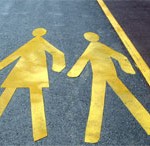Search Results
All Results
-
Green-Collar Jobs: The Secret History
In 1999, Sightline (then Northwest Environment Watch) published a slim book called Green-Collar Jobs. Researched and written by Alan Durning, the book chronicles the changing economic base of rural towns in the Pacific Northwest, from resource extraction industries such as timber to “green-collar” jobs such as sustainable forestry, ecosystem restoration, and tourism. The book was well-received as a landmark study of the post-logging Northwest economy. Fast forward to 2007. Sightline...Read more » -
What’s Walkable?
A collection of research and solutions–including walkscore.com–for creating walkable communities and why it’s important.Read more » -
Top Story: Man Carless in Ballard
Update: Watch the story here. If you’re in range, tune into KOMO television (channel 4 in Seattle) tonight at 5 pm to see Alan Durning taking carlessness to the streets—literally. KOMO’s John Sharify interviewed Alan this sunny morning and caught footage of the Durning family’s car-less experiment in action, telling the story of how a neighborhood like theirs—compact, with nearby shops and services, bike and pedestrian-friendly street design, and good bus service—has made the year-long...Read more » -
Seeing Green
If you haven’t yet seen this encomium to Alan Durning (and Sightline), well, we’re certainly not above pointing you to it. It’s here. It takes Alan’s journey into the realms of carless-ness as an example of the larger challenges of aligning our lives with our principles. It’s also about what we can do: namely, fix the systems that make it so tough to live sustainably. And we like author Bill...Read more » -
Liberty, Property, and Zillow.com
Last month, Cascadians handed a stunning defeat to the so-called property rights ballot measures across the Northwest that would have granted unprecedented freedom to property owners. Does this signify a rejection of a bedrock value for northwesterners—freedom? Not at all, argues Alan Durning in his recent essay on freedom and property values. Rather, Cascadians understand how our individual freedom is protected by democratic standards. Just look at Zillow.com, the property...Read more » -
What Is Your Place Like?
With our often transient lifestyles, it’s a question that many North Americans can’t easily answer. Alan Durning set out to answer this question for himself in the award-winning book, This Place on Earth: Home and the Practice of Permanence, (free pdf), about returning with his family to the Pacific Northwest and founding Northwest Environment Watch (now Sightline). From skyscrapers in Vancouver to farms in the Palouse, Alan reflects on everything...Read more » -
Car-less Vacation, Five Lessons
Our car-less family vacation in Vancouver, BC, was a big success. Here’s a full report, for those of you who shared your own car-lessvacation stories and are interested in such things. For the rest of you, you might want to skim the travelogue to find the five lessons I draw. The only nail-biter (if you can call it that) was the very first leg of the trip, which resembled the...Read more » -
Why Bikes Are a Sustainable Wonder
Two-wheeling ranks as the most energy-efficient form of travel, especially for short trips–and makes you healthier.Read more » -
The Accounting Scandal of GDP
Just in time for the release of new GDP numbers at the end of this month, Alan Durning has penned a piece on why these figures are as bogus as Enron’s balance sheets—and why there needs to be a new program to dethrone GDP once and for all. Read the full piece on Tidepool.org, Sightline’s online news service. Here’s an excerpt: Estimated twelve times a year by the U.S. Department...Read more » -
Sustainability’s Slow-motion Revolution
What makes the impossible become inevitable? History shows that an unarguable principle and a small corps of dedicated people can slowly but surely change the course of the future. Today, Sightline is publishing a year-end essay by executive director Alan Durning that applies history’s lessons of social change to the Northwest’s movement toward sustainability—a healthy, lasting prosperity grounded in place. In the piece, he sets the campaign for a sustainable...Read more »




